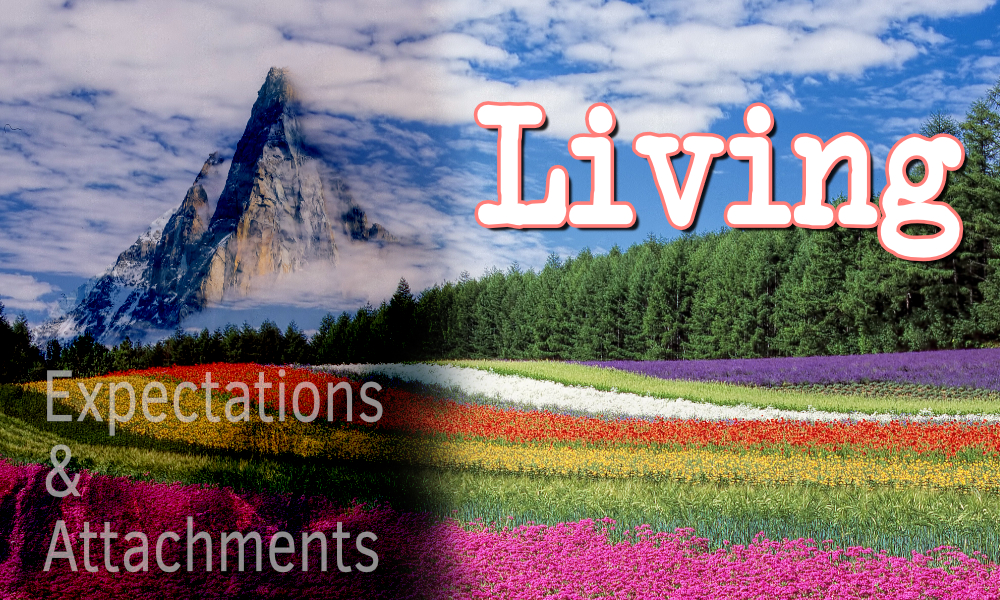Living With Attachments To My Expected Outcomes
~ Donald L. O’Dell
When I’m analytical (a very clear indication of my egoic thinking), my ego uses my all-pervasive guilt to turn thoughts of compassion into a “task” for me to accomplish, not a lifestyle of happiness and gratitude to be expressed. That’s a pattern I have been fighting for a long time and probably will fight for years to come.

A friend of a friend asked me the following last week: “Do you think Nirvana a place or a split second in time when clarity appears, leading to freedom to explore without constraint?”
I answered with: “I don't know that much about Hindu/Buddhist concepts of Nirvana, but I do not think it is a place. However, what I do think I know about Nirvana is that it may be very similar to A Course in Miracles (ACIM) concept of "Holy Instant." These are those special times when 2 (or more) people suddenly have a glimpse of each other that defies time and our individual perceptions. We truly "see" each other as already-loved eternal spirits. We "sense" our Oneness. We experience the "Christ" in each other. Time and differences simply disappear. According to ACIM, these occurrences or Holy Instants cannot be conjured up at will but happen at the behest of the Holy Spirit, who is responsible for altering our perception - from egoic to "real." If we could maintain this kind of awareness all the time, we would be just like Jesus the Christ.”
In short, a Holy Instant, according to ACIM, is not a once-and-done kind of thing. It is an on-going and growing sense of what reality truly is: Love, Acceptance, Oneness.
This friend of a friend then responded (and I use this with his permission) with a message about his personal spiritual journey ending with this quote from the Dalai Lama – well worth repeating here:
"This, then, is my true religion, my simple faith. In this sense, there is no need for Temple or Church; for Mosque or Synagogue; no need for complicated philosophy, doctrine, or dogma.
Our open heart, our own mind, is the Temple. The doctrine is Compassion.
Love for others and respect for their rights and dignity, no matter who or what they are; ultimately these are all we need.
So long as we practice these in our daily lives, then no matter if we are learned or unlearned, whether we believe in Buddha or God, or follow some other Religion or none at all, as long as we have Compassion for others and conduct ourselves with restraint, out of a sense of responsibility, there is no doubt we will be happy."
– His Holiness, The 14th Dalai Lama.
his quote is beautiful, concise, well-written and I couldn’t agree with it more. However, when it’s presented like this I find myself very vulnerable to falling into a trap – albeit a very sophisticated and subtle trap created by my ego. It has to do with my egoic mind and its perceptions and attachments.
Ahh! Yes. My good, old attachments to expected outcomes.
“…Compassion for others and conducting myself with restraint out of a sense of responsibility…” Boy! Can my ego get ahold of this! I have found myself cloaking my “compassion for others” as well as my “restraint out of a sense of responsibility” with a sense of martyrdom or altruism or other-centeredness. This lasts a while until my hopes are dashed and I am tired, frustrated, drained and angry. Why? Because lurking behind these noble intentions of mine are my pervasive sense of guilt (Isn’t this what I’m supposed to do?) and my implicit attachments to outcomes.
Sometimes these expectations or attachments are as simple as imagining God saying to me, “Well done my good and faithful servant.” or “I went out of my way to help, and look at what it got me. Nothing! I guess it’s true: No good deed goes unpunished.” or “These recipients of my altruism were supposed to be grateful and acknowledge my contribution. They never even noticed.” or “I did what I thought was right for them, and look at where it got me.” or “I just don’t understand why they don’t see the truth of what I’m trying to do for them. I can see their alcoholism, or addiction or codependence, and what I do has worked for me. Don’t they understand if they’d only start […fill in the blank …] their lives would become better – like mine has?”
All this stems from my egoic thinking. When I’m analytical, my ego uses my all-pervasive guilt to turn the Dalai Lama’s statements into a “task” for me to accomplish, not a lifestyle of happiness and gratitude to be expressed. That’s a pattern I have been fighting for a long time and probably will fight for years to come.
I’ve commented in these messages before how I spent years trying to “Shine my light.” Then I learned from a friend in ACIM that I should be trying to eliminate the dark curtains I’d drawn over my Self that prevented the light already within me from being seen. That’s a huge difference – trying to shine my light rather than allowing my light to shine.
The Dalai Lama’s message describes what it’s like to allow my light to shine. But, almost instinctively, I want to turn it into a goal I need to achieve. If I’m not vigilant, my ego will use my guilt to entrap me into operating out of a sense of martyrdom, altruism or other-centeredness. My attachments to outcomes, associated with these “goals,” always damn me.
Although these messages are mostly for me, thanks for listening. As always – feel free to forward this message to your friends, family, and those accompanying you on your spiritual journey.
Blessings, Don
April 18, 2024



